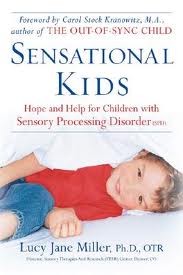I still remember the life changing moment when I read (ok--devoured) my first book about sensory processing symptoms. I was a mother trying to figure out my one year old, feeling defeated in many ways, and then I said "Yes, that is my kid!" The book I read was The Out of Sync Child. Even though I am a Neuropsychologist, specializing in brain behavior relationships, I worked primarily with adults and had not learned about sensory processing symptoms.
Sensory processing occurs in every individual. Our brain helps us make sense of our environment. "What does this sensation mean? What is my environment trying to tell me?" Sensations include a wide variety of things like sounds, sights, smells, touch, and taste, but also things like vibration, deep pressure, join input (stretching and pressure), balance and vestibular (movement) sensations, and pain. Someone with a good ability to take in and understand sensations feels comfortable in their environment, unless of course there is a signal of danger. Then they adapt, get safer, get more comfortable, whatever adjustments need to be made.
Individuals with sensory dysfunction, may hear a noise and their brain experiences it as too loud! They may climb a jungle gym, and become frightened. Their body isn't giving them good information about where they are in space. They may perform normal grooming activities and feel pain, much more than someone else would. Some individuals get the message from their brain that they aren't receiving enough information from their environment. These individuals can seek much more sensory stimuli than a more typical person would. They may shout and crash into things. They may spin in circles and crave crunchy, spicy food.
Sometimes children show just a few symptoms that then resolve as they grow older. Maybe they are picky eaters for example, or don't tolerate clothing very easily. Other children seem to show a very significant amount of sensory dysfunction, making it difficult for them to feel safe and comfortable, eat food and perform hygiene, and even pay attention in class. Because join input can help us attend better, they may do well if given heavy tasks at home or the classroom (e.g., carrying a large stack of books, pushing furniture, pulling a wagon, carrying a heavy book bag).
Unfortunately, many children are labeled as uncooperative and inattentive because they are different sensory needs. Many children with sensory symptoms may fall in the ADD or Autistic Spectrum categories. Alternatively, in May of 2013, a new category called Sensory Processing Disorder is being defined.
There are great book resources out their for parents and teachers trying to help children learn, grow, and meet their sensory needs. I personally read The Out of Sync Child series and loved it. Other very good books come highly recommended from various sources as well.
The Out of Sync Child
I also liked the companion book which gives ideas for activities to help kids regulate successfully:
The Out of Sync Child Has Fun
You may also want to try one of these books:
Raising a Sensory Smart Child






